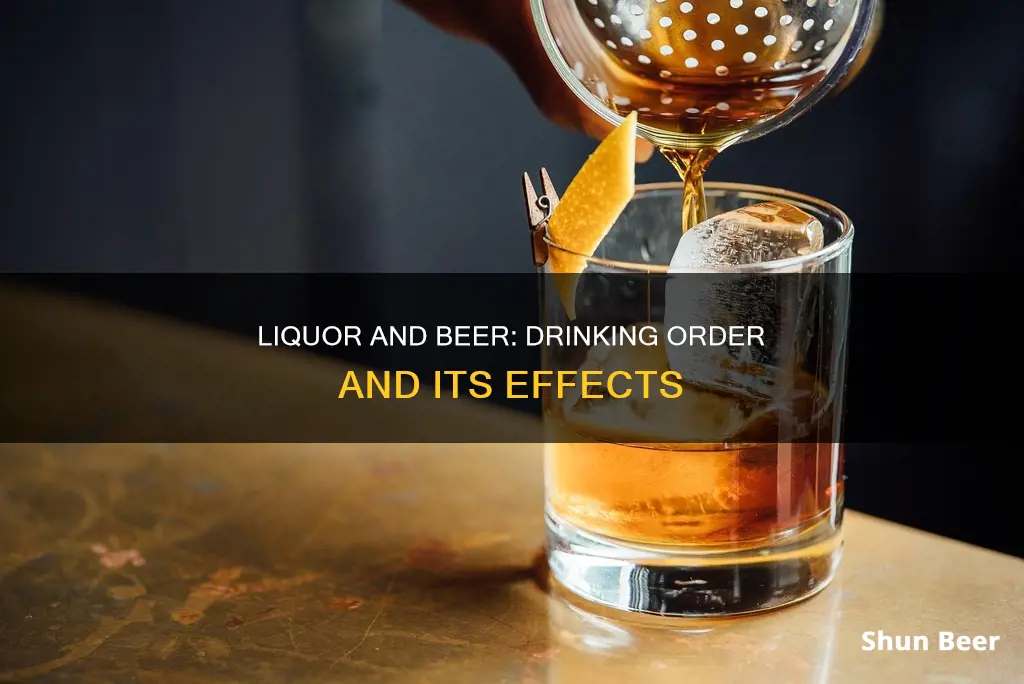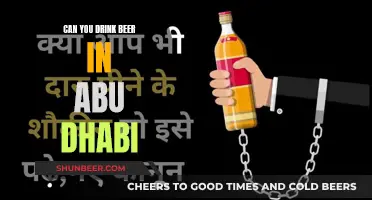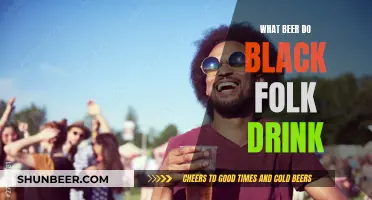
Beer before liquor, never been sicker; liquor before beer, you're in the clear is a well-known phrase among drinkers. The saying suggests that drinking beer before liquor will make you sick, while drinking liquor before beer will leave you hangover-free. However, this is just a myth, with no scientific basis to support it. The amount of alcohol consumed and other factors like food intake, genetics, and smoking are what influence the severity of hangovers, not the order in which drinks are consumed.
| Characteristics | Values |
|---|---|
| Common Saying | "Beer before liquor, never been sicker; liquor before beer, you're in the clear." |
| Truth | There is no scientific proof that drinking beer before liquor will make you sick. |
| Factors that Affect Hangovers | Amount of alcohol consumed, food consumed, frequency of drinking, genetics, congeners, smoking. |
What You'll Learn
- The myth is based on the idea that liquor spikes your blood alcohol levels faster than beer
- Carbonation in beer and sparkling drinks may irritate the stomach lining, increasing alcohol absorption
- Drinking beer first may lead to drinking more overall, as liquor lowers inhibitions faster
- Drinking beer first may lead to higher sugar consumption, as mixers often contain more sugar than beer
- The amount of food in your system can slow the absorption of alcohol

The myth is based on the idea that liquor spikes your blood alcohol levels faster than beer
The saying "beer before liquor, never been sicker; liquor before beer, you're in the clear" is a widely popular phrase with unknown origins. The myth is based on the idea that liquor spikes your blood alcohol levels faster than beer. This is because liquor has a higher alcohol content than beer, so drinking it first will cause your inhibition to decrease more quickly, leading to drinking more.
However, this theory is not supported by scientific evidence. The order in which you consume alcoholic beverages does not affect how it impacts your body. The amount of alcohol consumed and the presence of food in your system are the main factors that influence the severity of a hangover.
The myth may have originated from the way we digest alcohol. Carbonated drinks like beer and sparkling wine can irritate the stomach lining, increasing the rate of alcohol absorption. Additionally, people tend to drink more beer than liquor, so starting with liquor may lead to drinking less overall. However, the order of drinks does not affect the total amount of alcohol consumed, which is the main determinant of a hangover.
While the "beer before liquor" saying is not based on scientific facts, there are some strategies to reduce the risk of a hangover. These include drinking in moderation, not drinking on an empty stomach, and staying hydrated by drinking water along with alcoholic beverages.
Celebrating National Drink a Beer Day in September
You may want to see also

Carbonation in beer and sparkling drinks may irritate the stomach lining, increasing alcohol absorption
The popular saying, "beer before liquor, never been sicker; liquor before beer, you're in the clear," suggests that drinking beer before liquor may worsen hangover symptoms. However, the order of drinks is unlikely to be the sole cause of feeling unwell. Instead, the absolute volume of alcohol consumed, the rate of consumption, and individual factors such as body composition and health conditions play more significant roles.
Carbonation in drinks like beer and sparkling beverages can have an impact on alcohol absorption. Carbonation temporarily increases the rate at which alcohol enters the bloodstream. Studies show that carbonation in drinks can speed up alcohol absorption by up to 40-50%. This effect is likely due to carbonation increasing the movement of liquids from the stomach to the small intestine, where ethanol is absorbed. As a result, the ethanol from alcoholic beverages with carbonation may reach the small intestine faster than from flat drinks.
However, it's important to note that the effects of carbonation on alcohol absorption are temporary and may even out over time. Ultimately, the total amount of alcohol consumed is a more critical factor in intoxication and hangover severity. Additionally, carbonation itself can cause digestive issues such as stomach pain, bloating, and gas, which may contribute to discomfort when consuming carbonated alcoholic drinks.
While carbonation can affect alcohol absorption, other factors also influence how quickly alcohol enters the bloodstream. For example, drinking on an empty stomach allows alcohol to move rapidly from the stomach to the intestines, increasing absorption. High alcohol content, drinking speed, gender, and individual health factors also play a role in alcohol absorption and how intoxicated one feels.
In conclusion, while carbonation in beer and sparkling drinks may irritate the stomach lining and temporarily increase alcohol absorption, it is just one of many factors that contribute to intoxication and hangover symptoms. The total amount of alcohol consumed, individual health factors, and other variables also play significant roles in how the body processes alcohol.
Drinking and Driving: Half a Beer, Is it Safe?
You may want to see also

Drinking beer first may lead to drinking more overall, as liquor lowers inhibitions faster
There are a few reasons why drinking beer first may lead to drinking more overall. Firstly, liquor has a higher alcohol content than beer, so starting with liquor will cause your inhibitions to decrease more quickly, leading to drinking more. Beer is also typically consumed more slowly due to its larger volume, resulting in a lower alcohol consumption rate per minute compared to liquor.
The order in which you drink different types of alcohol may not have a significant impact on the severity of a hangover. Instead, the total amount of alcohol consumed and individual factors such as genetics, congeners, and whether you ate before drinking play a more crucial role in determining the likelihood and intensity of a hangover.
However, it is worth noting that carbonated drinks like beer can irritate the stomach lining, increasing the rate of alcohol absorption. This means that drinking beer first may lead to a faster increase in blood alcohol levels, which could potentially contribute to a worse hangover.
While the "beer before liquor, never been sicker" saying may not hold scientific validity, it is important to remember that drinking in moderation and staying hydrated by drinking water between alcoholic beverages are key to avoiding unpleasant after-effects.
Good Friday Beer: Is It Allowed?
You may want to see also

Drinking beer first may lead to higher sugar consumption, as mixers often contain more sugar than beer
There is an age-old saying, "beer before liquor, never been sicker; liquor before beer, you're in the clear," which refers to the idea that drinking beer before liquor may help you avoid a hangover. However, the order in which you consume your drinks is unlikely to influence whether you experience a hangover the next day. Instead, the total amount of alcohol consumed and other factors such as the presence of congeners, smoking, and genetics play a more significant role in determining the severity of a hangover.
When it comes to sugar consumption, drinking beer first may lead to higher overall sugar intake, especially if you transition to mixed drinks or cocktails. Beer itself contains carbohydrates that get absorbed into the bloodstream relatively quickly, leading to increased glucose levels. While the sugar content in beer is relatively low, ranging from 1.9 to 6 grams per can, drinking multiple beers can cause the sugar to add up.
Additionally, mixers used in cocktails, such as sodas or simple syrups, can easily add over 30 grams of sugar per drink. This is significantly higher than the sugar content in beer. Therefore, if you start with beer and then move on to mixed drinks, you are likely to consume more sugar overall.
Furthermore, alcohol stimulates the appetite, so drinking beer with a meal may lead to overeating. This can further increase blood glucose levels and contribute to weight gain. Therefore, drinking beer first may indirectly lead to higher sugar consumption through increased appetite and calorie intake.
In conclusion, while the order of drinks may not significantly affect the likelihood of a hangover, drinking beer before liquor may lead to higher sugar consumption, especially when followed by mixed drinks or cocktails with high-sugar mixers.
Liquor to Beer: A Healthy Transition or Dangerous Myth?
You may want to see also

The amount of food in your system can slow the absorption of alcohol
The popular saying goes, "beer before liquor, never been sicker; liquor before beer, you're in the clear". However, the order in which you consume your drinks is unlikely to influence whether you experience a hangover the next day. This is because alcohol begins to be absorbed into your bloodstream as soon as it reaches your stomach, and all the alcohol you drank the night before will have been absorbed well before your hangover takes effect.
That being said, the amount of food in your system can slow the absorption of alcohol. Eating food before or during drinking can reduce your peak blood alcohol level. This is because having food in your stomach slows the transfer of alcohol from the stomach to the small intestine, which is where alcohol is absorbed the quickest. This allows enzymes in the stomach lining more time to inactivate the alcohol.
Food also decreases the speed of alcohol reaching the liver from the small intestine. This slow transfer of alcohol through the liver facilitates more efficient alcohol inactivation before it gets into the main circulation. Overall, less alcohol gets into your circulating blood.
Additionally, food has been found to have another effect on alcohol even after it is already in your bloodstream. It increases the liver's speed at inactivating it. This is likely caused by food stimulating increased blood flow to the liver as well as directly increasing liver enzyme activity. However, the liver's capacity to inactivate alcohol can be readily saturated, and food's effect here is limited. In other words, although food can be helpful, you can't rely on eating to sober you up after alcohol is already in your system.
Gluten Intolerance and Beer: Is It Safe to Drink?
You may want to see also
Frequently asked questions
No, this is just a long-standing myth. It is not true. The most important factor when it comes to a hangover is the quantity of alcohol you consume.
One hypothesis is that most people start their night with drinks that have a lower alcohol content, such as beer, and move on to liquor later in the evening. If they get sick at the end of the night or feel terrible the next morning, they blame it on the drinking order. Another theory is that carbonated drinks like beer irritate the stomach lining, increasing the rate of alcohol absorption.
To avoid a hangover, make sure you're drinking plenty of water, pace yourself, and don't drink on an empty stomach.







